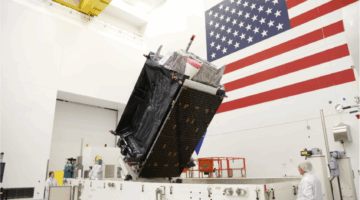
WASHINGTON: The chief of the French Navy says the US Navy’s strong interest in unmanned systems is reflected in Europe and that one goal of his visit stateside was to learn more about the technology to guide his own country’s future investments.
“The budgets in Europe will raise and so the effort [to develop new technologies] is back in France and Europe. It was not the case in the past,” Adm. Pierre Vandier told a small group of reporters at the Washington Navy Yard this morning.
“I went to San Francisco to see the tech and the Silicon Valley to feel the mood of this high-tech industry, and then I went in San Diego to visit some smart ships… the Zumwalt class, I visited the unmanned fleet, I visited a new project in communications,” he said.
RELATED: Can European industry support Macron’s ‘war-time economy’? Firms are wary
Vandier is in the United States for his second visit this year, and Chief of Naval Operations Adm. Michael Gilday today presented him with a Legion of Merit Award during a full honors ceremony.
While speaking to reporters following the event held in front of the CNO’s home at the Navy Yard, unmanned capabilities, and their expense, were top of mind for Vandier.
“It [unmanned] requests a huge amount of money, especially for surface unmanned ships. We are going to unmanned ships for mine hunting and so the first system would be operational at the end of the year in France,” he said.
The French Navy chief also said the main advantage he believes the US military holds is in advancements made by Silicon Valley in IT and cloud computing, adding that technology for managing big data is something many European countries are “late” on.
Vandier’s comments at a time when countries across Europe are increasing their defense budgets in the wake of Russia’s war against Ukraine. Breaking Defense reported in March that Germany, Belgium, Romania, Italy, Poland, Norway and Sweden have all pledged to invest more heavily in their militaries.
At that time, it was not clear how France’s defense spending might change because the country was in the middle of a presidential election season. But President Emmanuel Macron, who in April won re-election, made it a campaign promise to increase defense spending if given another term in office.
“We do need to spend a lot, but we need to have a European strategy for industry and innovation because it’s good for our industries and our industrialists, it’s good for employment in our countries, it’s good to have a capacity for innovation that is dual and that our economy needs, and it’s good for our strategic sovereignty,” Macron told the audience at Eurosatory, the European defense conference in Paris last week.

